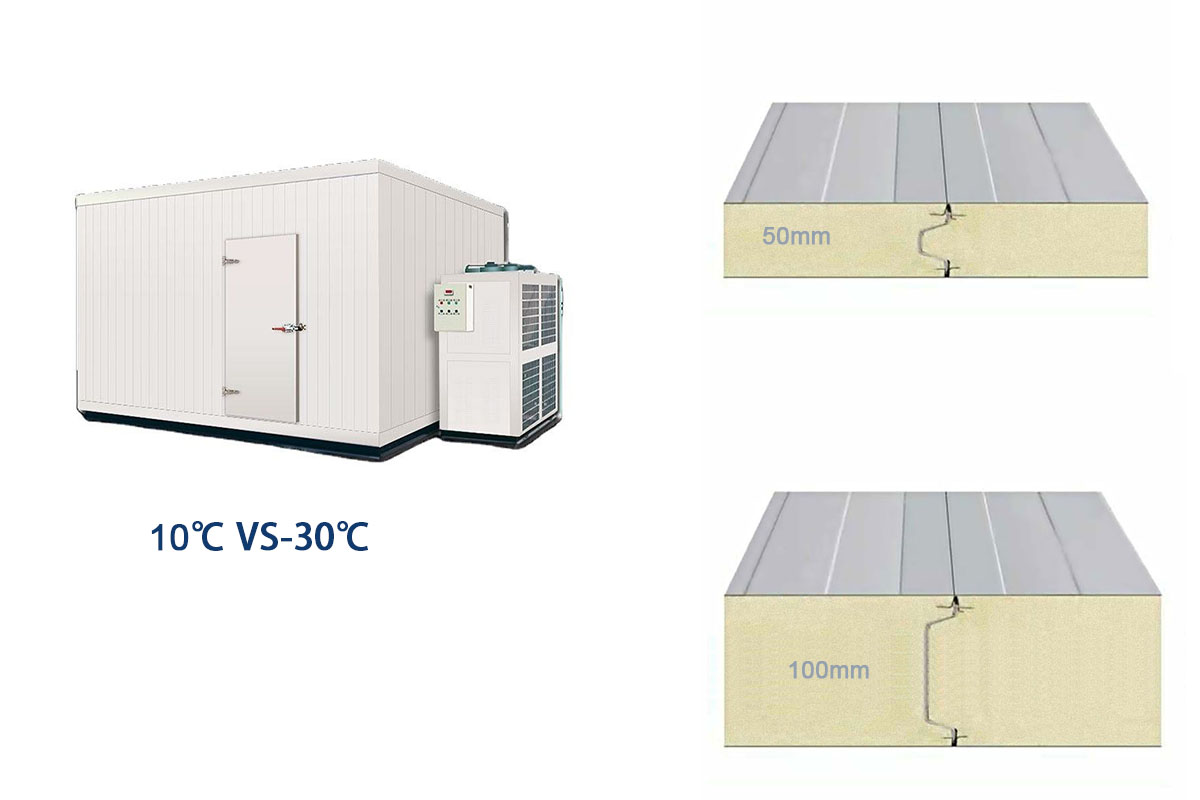Choosing the appropriate thickness of insulation board is crucial in the design and construction of cold storage, as it directly affects energy consumption, temperature stability, and long-term operating costs. How to choose cold storage panels with thicknesses of 50mm and 100mm for 10 ℃ and -30 ℃ refrigerated warehouses?

The advantages of 50mm cold storage panel (suitable for 10 ℃ environment)
Lower cost - materials and installation costs are more economical.
Space saving - Thinner sheets can maximize the usable area inside the warehouse.
Adequate insulation performance - stable in environments ranging from room temperature to low temperature.
The advantages of 100mm cold storage panels (suitable for -30 ℃ environment)
Stronger insulation performance - significantly reduces cold loss and lowers the risk of frost formation.
Energy saving - reduces the load on the compressor, making long-term operation more economical.
More stable temperature - avoid frequent start stop and extend equipment life.
Frequency of use - For cold storage rooms that frequently open and close doors, it is recommended to increase the insulation layer.
Industry standards - Some food and pharmaceutical cold chains have strict insulation standards.
-30 ℃ freezer → 100mm thickness (must be selected, otherwise high energy consumption and large temperature fluctuations).
The correct selection of cold storage panel thickness can not only reduce operating costs, but also ensure the quality and safety of stored items. However, in practical decision-making, multiple factors need to be considered comprehensively. Please feel free to contact us, and we will customize an exclusive solution for you to ensure that your cold storage construction needs are met.

10 ℃ refrigerated warehouse: 50mm thickness is usually sufficient
Suitable for refrigeration and preservation (such as vegetables, fruits, dairy products, beverages, etc.), the temperature requirement is usually between 0 ℃ and 10 ℃, and a 50mm thick polyurethane/PIR cold storage panel can meet the demand.The advantages of 50mm cold storage panel (suitable for 10 ℃ environment)
Lower cost - materials and installation costs are more economical.
Space saving - Thinner sheets can maximize the usable area inside the warehouse.
Adequate insulation performance - stable in environments ranging from room temperature to low temperature.
-30 ℃ freezer: 100mm thickness must be selected
Suitable for ultra-low temperature freezing (such as meat, seafood, ice cream, pharmaceutical cold chain, etc.), the temperature needs to be maintained at -18 ℃~-30 ℃ or even lower. At this time, a 100mm thick cold storage panel is a better choice.The advantages of 100mm cold storage panels (suitable for -30 ℃ environment)
Stronger insulation performance - significantly reduces cold loss and lowers the risk of frost formation.
Energy saving - reduces the load on the compressor, making long-term operation more economical.
More stable temperature - avoid frequent start stop and extend equipment life.
Key factors for selecting the thickness of cold storage panels
Environmental temperature impact - If the cold storage is located in a high-temperature area, a thicker insulation layer may be required.Frequency of use - For cold storage rooms that frequently open and close doors, it is recommended to increase the insulation layer.
Industry standards - Some food and pharmaceutical cold chains have strict insulation standards.
Conclusion and Suggestions
10 ℃ refrigerated warehouse → 50mm thickness (cost-effective, suitable for general refrigeration needs).-30 ℃ freezer → 100mm thickness (must be selected, otherwise high energy consumption and large temperature fluctuations).
The correct selection of cold storage panel thickness can not only reduce operating costs, but also ensure the quality and safety of stored items. However, in practical decision-making, multiple factors need to be considered comprehensively. Please feel free to contact us, and we will customize an exclusive solution for you to ensure that your cold storage construction needs are met.


